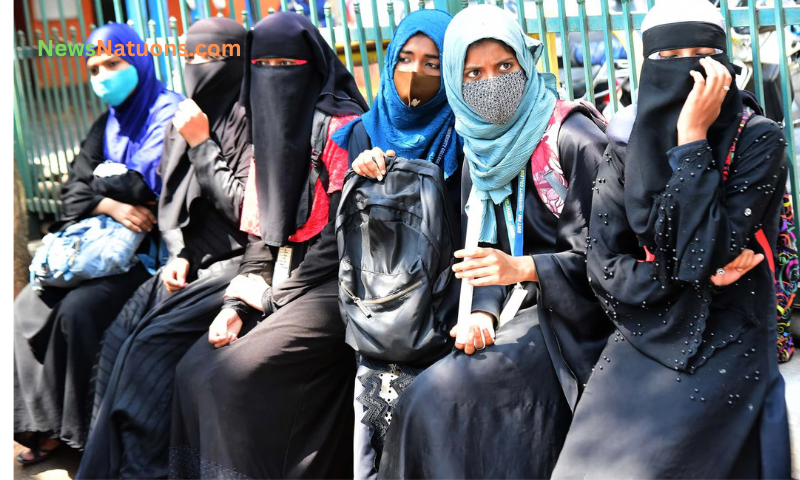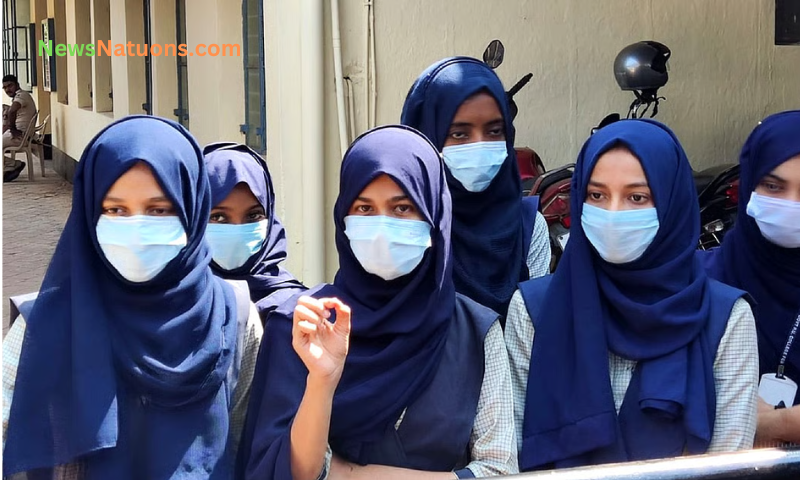In a move that has sparked widespread debate, Danish Prime Minister Mette Frederiksen has announced plans to extend the existing ban on Islamic face coverings to include schools and universities. This controversial proposal builds upon Denmark’s previous legislation introduced in 2018, which prohibited full-face veils such as the niqab and burqa in public places. Now, the Danish government aims to impose similar restrictions within educational institutions, citing concerns about religious influence in public institutions and the protection of democratic values.
Prime Minister’s Justification for the Expansion
Speaking to Danish news agency Ritzau, Frederiksen emphasized that democracy should take precedence over religion, particularly within state-run institutions. She acknowledged that while individuals have the right to practice their faith, religious practices should be limited in spaces such as schools and universities, where public governance and secular principles dominate.
Frederiksen further expressed concerns about designated prayer rooms within universities, arguing that these spaces may contribute to social pressure and even coercion, especially among young women. She believes that the removal of these facilities will help create a more neutral and inclusive environment for all students, irrespective of their religious beliefs.
Religious Freedom Versus Secular Governance
The Prime Minister’s statements have reignited the ongoing debate between upholding religious freedoms and enforcing secular governance in public institutions. Critics argue that such measures unfairly target Muslim women and infringe upon basic human rights. Supporters, however, believe that the policy reinforces the country’s commitment to equality and protects vulnerable individuals from religious oppression.
Frederiksen insists that her proposal is not an attack on religion but rather an attempt to prevent any form of societal or gender-based pressure in public educational spaces. As a woman and the country’s leader, she claims to be particularly sensitive to any practices that may marginalize or limit the freedoms of women, including cultural expectations around modesty and dress.
The History of the Face-Covering Ban in Denmark
Denmark first introduced its face-covering ban in August 2018. The law made it illegal to wear garments that cover the face in public places, including the Islamic burqa and niqab. The move sparked protests and was criticized by human rights organizations across Europe. However, the Danish government defended the law, stating it was intended to promote social cohesion and ensure open communication between citizens.
Since the implementation of the law, its enforcement has been relatively limited, with only a handful of fines issued annually. Nonetheless, the symbolic nature of the legislation continues to be powerful, especially within broader political discussions about immigration, integration, and national identity.
Uncertainty About the Prevalence of the Issue
Interestingly, Frederiksen admitted she does not know how widespread the use of religious coverings or prayer rooms in schools and universities actually is. Despite this uncertainty, she maintained that the expansion of the ban is a necessary step to preserve secular values and ensure that students are not subjected to religious influence within their educational environments.
This admission has raised concerns among critics who argue that policymaking should be based on data and evidence rather than assumptions or political messaging. Several voices have urged the Danish government to conduct thorough studies before implementing restrictions that could significantly impact minority communities.
Potential Impact on Muslim Students
If implemented, the extended ban could significantly affect Muslim students, especially women who choose to wear the hijab, niqab, or burqa as part of their religious and cultural identity. Many Muslim women see these garments as symbols of empowerment and personal choice rather than oppression. A ban could therefore be perceived as discriminatory and marginalizing.
Human rights groups and civil liberties organizations have warned that such laws risk alienating Muslim communities and deepening social divisions. Rather than fostering integration, critics argue that these policies may lead to further exclusion and isolation of religious minorities.
Broader European Context
Denmark is not the only European country to introduce bans on face coverings in public or educational spaces. France, Belgium, Austria, and several regions in Germany have enacted similar legislation, each citing various concerns ranging from national security to gender equality. The growing number of such policies across Europe reflects a wider cultural and political tension surrounding Islam, immigration, and secularism.
However, the consequences of these laws remain a point of contention. While some believe they protect secular values, others argue they disproportionately affect Muslim women and contribute to negative stereotypes and discrimination.
Final Thoughts
Mette Frederiksen’s proposal to expand Denmark’s hijab ban into schools and universities is a bold and contentious step. While it is framed as a defense of democracy and women’s rights, it also raises serious questions about religious freedom, inclusion, and the treatment of minorities. The future of this legislation will likely depend on both political will and public response, but one thing is clear: the debate surrounding religion and secularism in public institutions is far from over in Denmark.
ڈنمارک کی وزیر اعظم میٹے فریڈرکسن نے اعلان کیا ہے کہ ملک میں پہلے سے موجود چہرہ ڈھانپنے والے اسلامی لباس پر پابندی کو اب سکولوں اور جامعات تک وسعت دی جائے گی۔ یہ متنازعہ تجویز 2018 میں نافذ کیے گئے قانون کی توسیع ہے، جس کے تحت عوامی مقامات پر برقعہ اور نقاب پر پابندی لگائی گئی تھی۔ اب حکومت چاہتی ہے کہ یہی پابندی تعلیمی اداروں میں بھی نافذ کی جائے تاکہ ریاستی اداروں میں مذہبی اثر و رسوخ کو کم کیا جا سکے۔
وزیراعظم کی دلیل اور موقف
ڈینش نیوز ایجنسی Ritzau کو دیے گئے بیان میں وزیر اعظم میٹے فریڈرکسن نے کہا کہ جمہوریت کو مذہب پر فوقیت حاصل ہونی چاہیے، خاص طور پر سرکاری اداروں میں۔ ان کے مطابق ہر شخص کو اپنے عقیدے پر عمل کرنے کا حق حاصل ہے لیکن تعلیمی اداروں جیسے مقامات پر مذہبی رسومات پر پابندی ہونی چاہیے تاکہ ریاست کی غیر جانبداری قائم رہے۔
انہوں نے مزید کہا کہ وہ یونیورسٹیوں میں موجود نماز کے لیے مخصوص کمروں کو بھی بند کرنا چاہتی ہیں کیونکہ ان کے بقول یہ کمزور طلبا، خاص طور پر لڑکیوں پر سماجی دباؤ ڈال سکتے ہیں۔ ان کا کہنا تھا کہ ان کمروں کی بندش سے ایک ایسا ماحول قائم کیا جا سکے گا جہاں تمام طلبا خود کو یکساں محسوس کریں۔
مذہبی آزادی بمقابلہ سیکولر نظام
وزیراعظم کے اس بیان نے ایک بار پھر یہ بحث چھیڑ دی ہے کہ آیا مذہبی آزادی کو مقدم رکھا جائے یا سرکاری اداروں میں سیکولر نظام کو۔ نقادوں کا کہنا ہے کہ اس طرح کی پالیسیز خاص طور پر مسلم خواتین کو نشانہ بناتی ہیں اور ان کے بنیادی حقوق پر قدغن لگاتی ہیں۔ دوسری جانب، حامیوں کا ماننا ہے کہ یہ اقدام مساوات کو فروغ دیتا ہے اور عورتوں کو دباؤ سے بچاتا ہے۔
فریڈرکسن کا اصرار ہے کہ ان کی تجویز مذہب پر حملہ نہیں بلکہ ایک ایسا قدم ہے جو سرکاری اداروں میں کسی بھی طرح کے جبر یا دباؤ کو روکتا ہے۔ ان کا کہنا ہے کہ بطور خاتون اور وزیراعظم، وہ ایسے کسی بھی عمل کی اجازت نہیں دے سکتیں جو خواتین کی آزادی میں رکاوٹ بنے۔
ڈنمارک میں نقاب پر پابندی کا پس منظر
ڈنمارک نے اگست 2018 میں عوامی مقامات پر چہرہ چھپانے والے لباس پر پابندی لگائی تھی۔ اس قانون کے تحت برقعہ اور نقاب پہننے پر پابندی عائد کی گئی تھی، جس پر یورپ بھر میں شدید تنقید ہوئی۔ اگرچہ اس قانون پر سختی سے عمل درآمد نہیں ہوا اور چند ہی افراد پر جرمانہ عائد کیا گیا، لیکن اس قانون کی علامتی حیثیت بہت اہم مانی جاتی ہے۔
یہ قانون امیگریشن، انضمام اور قومی شناخت جیسے حساس موضوعات سے جڑا ہوا ہے، اور اسی لیے اب اس قانون کو تعلیمی اداروں میں بھی نافذ کرنے کی کوشش کی جا رہی ہے۔
رجحان کے پھیلاؤ سے متعلق غیر یقینی

دلچسپ بات یہ ہے کہ وزیراعظم نے خود اعتراف کیا ہے کہ وہ اس بات سے واقف نہیں کہ سکولوں اور جامعات میں یہ رجحان کس حد تک پھیل چکا ہے۔ لیکن ان کے مطابق، یہ قدم اس لیے ضروری ہے تاکہ سیکولر اصولوں کی حفاظت کی جا سکے اور طلبا کو مذہبی اثرات سے محفوظ رکھا جا سکے۔
تنقید کرنے والوں کا کہنا ہے کہ ایسے فیصلے بغیر تحقیق کے نہیں کیے جانے چاہئیں۔ حکومت کو چاہیے کہ وہ مکمل ڈیٹا اکٹھا کرے اور اس بنیاد پر فیصلے کرے تاکہ اقلیتوں کو نقصان نہ پہنچے۔
مسلم طلبا پر ممکنہ اثرات
اگر یہ قانون نافذ ہوا تو اس کا سب سے زیادہ اثر مسلم طلبا، خاص طور پر خواتین پر پڑے گا جو اپنے مذہب اور ثقافت کے تحت حجاب یا نقاب پہنتی ہیں۔ ان کے نزدیک یہ لباس ذاتی آزادی اور خودمختاری کی علامت ہوتا ہے۔ اس قانون کو وہ امتیازی سلوک تصور کریں گی۔
انسانی حقوق کی تنظیموں نے خبردار کیا ہے کہ ایسے قوانین مسلمانوں کو الگ تھلگ کر سکتے ہیں اور معاشرتی تقسیم میں اضافہ ہو سکتا ہے۔ ناقدین کا کہنا ہے کہ اس طرح کے اقدامات انضمام کے بجائے مزید دوریوں کو جنم دیں گے۔
یورپی پس منظر
ڈنمارک واحد ملک نہیں جس نے چہرہ چھپانے والے لباس پر پابندی لگائی ہو۔ فرانس، بیلجیم، آسٹریا اور جرمنی کے مختلف علاقوں میں بھی اسی قسم کے قوانین نافذ کیے جا چکے ہیں۔ ان قوانین کے پیچھے عمومی طور پر قومی سلامتی، صنفی مساوات اور سیکولرزم جیسے عوامل ہوتے ہیں۔
تاہم، ان قوانین کے اثرات پر تاحال اتفاق رائے نہیں پایا جاتا۔ کچھ لوگ انہیں قومی اقدار کا تحفظ سمجھتے ہیں جبکہ دیگر کے مطابق یہ اقدامات مسلم خواتین کو نشانہ بناتے ہیں اور امتیازی رویے کو فروغ دیتے ہیں۔
اختتامی خیالات
ڈنمارک کی وزیر اعظم کا تعلیمی اداروں میں حجاب پر پابندی بڑھانے کا منصوبہ یقینی طور پر ایک متنازعہ قدم ہے۔ بظاہر یہ اقدام جمہوریت اور خواتین کے حقوق کے تحفظ کے نام پر اٹھایا جا رہا ہے، لیکن اس کے ساتھ ہی یہ مذہبی آزادی اور اقلیتوں کے ساتھ سلوک سے متعلق کئی اہم سوالات بھی کھڑا کرتا ہے۔ اس قانون کا مستقبل عوامی ردعمل اور سیاسی فیصلوں پر منحصر ہوگا، لیکن یہ واضح ہے کہ ڈنمارک میں سیکولرزم اور مذہب کے درمیان کشمکش ابھی ختم نہیں ہوئی۔











